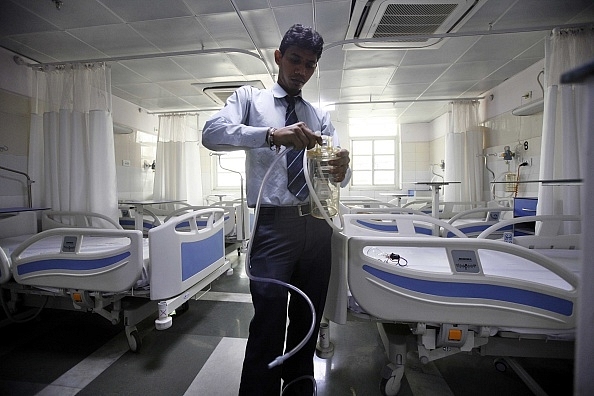Insta
Affordability, Quality Draw Urban Indians To Public Services: Government Schemes Gain Traction, Claims Survey

Hospital beds at Rajiv Gandhi super-speciality hospital in New Delhi. (Arun Sharma/Hindustan Times via Getty Images)
A nationwide study carried out by by the Centre for Monitoring the Indian Economy has revealed a lot of praise and a certain degree of criticism expressed by urban Indians for government programmes. The data also shows that urban residents believe that it is the government’s job to ensure the provision of basic amenities to them, reported Mint.
The study was a result of several multi-year Lok Foundation-Oxford University surveys in which more than 100,000 urban households participated.
It was found that almost as many urban children attend government schools as private ones, with half of all parents stating that they chose government schools due to greater affordability, while a third said it was because of their quality.
A greater number of households cited the quality reason in better-administered states such as Uttarakhand, Kerala, Karnataka and Tamil Nadu, while in more backward states such as Jharkhand and Bihar, people cited affordability as the main reason.
A majority of urban Indians also stated that they would prefer going to a government hospital over a private one, in case of both a minor and a major ailment. The most cited reason was again affordability.
However, higher middle income and rich households were more likely to rely on private healthcare.
Three-Fourths of urban residents were also found to have a ration card, with 70 per cent stating that they used the cards to buy subsidised rice. Two-thirds of respondents said that they were satisfied with the functioning of the Public Distribution System (PDS).
Even when it came to employment, 60 per cent of households believed that it was the government’s responsibility to fix the jobs crisis, and not the private sector’s.
Support Swarajya's 50 Ground Reports Project & Sponsor A Story
Every general election Swarajya does a 50 ground reports project.
Aimed only at serious readers and those who appreciate the nuances of political undercurrents, the project provides a sense of India's electoral landscape. As you know, these reports are produced after considerable investment of travel, time and effort on the ground.
This time too we've kicked off the project in style and have covered over 30 constituencies already. If you're someone who appreciates such work and have enjoyed our coverage please consider sponsoring a ground report for just Rs 2999 to Rs 19,999 - it goes a long way in helping us produce more quality reportage.
You can also back this project by becoming a subscriber for as little as Rs 999 - so do click on this links and choose a plan that suits you and back us.
Click below to contribute.
Latest